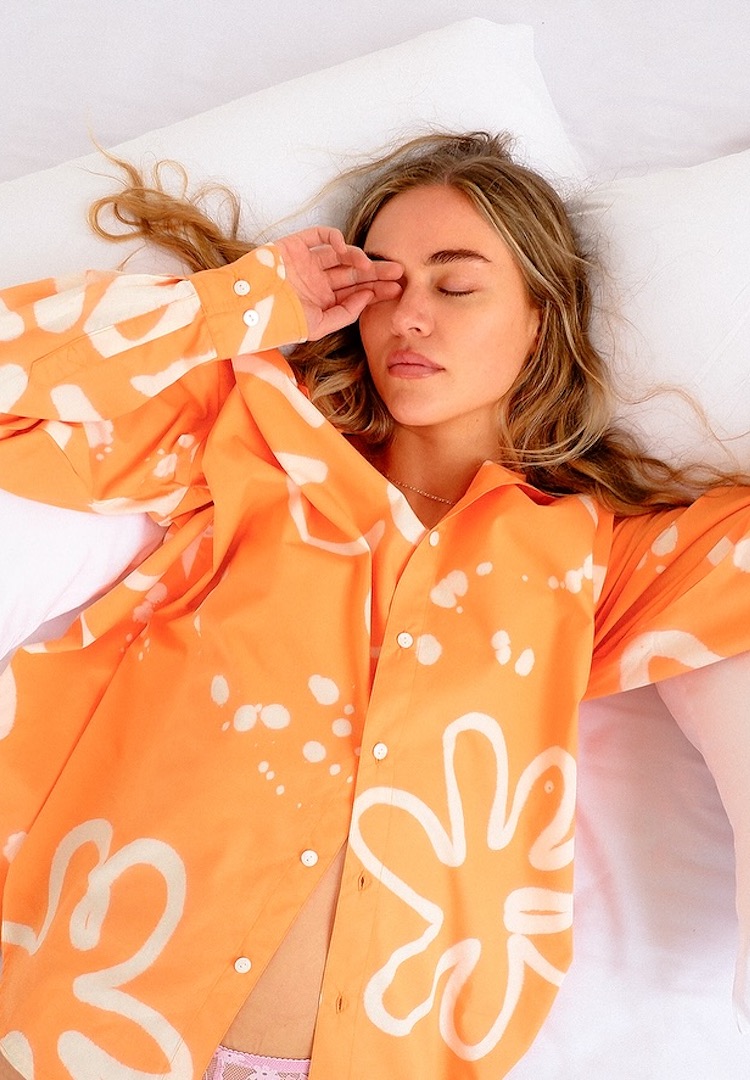I tried improving my sleep hygiene, here’s how it went
PHOTOGRAPHY BY NICOLE WONG
WORDS BY HANNAH COHEN
Sweet dreams!
As I’ve gotten older, making sure I catch quality z’s each night has climbed higher and higher in the order of my wellness priorities.
Over time, I’ve transitioned from staying out into the early hours of the morning and copping the next-day exhaustion on the chin, to putting every measure in place to ensure I have the most restorative sleep possible.
Call me a bit of a grandma, but getting eight hours of solid shut-eye each night is super important to me, so I’m always on the hunt for ways to improve the quality of sleep I’m getting.
For more content like this, browse through our Life section.
That’s why when the term ‘sleep hygiene’ kept popping up on my For You page and circulating through my Instagram feed, I jumped right on the case.
Is ‘sleep hygiene’ just a couple of buzz words ripped straight from the trending night routines of the ‘clean girls’, ‘hot girls’, and ‘it girls’ of the social media world? Or are there some beneficial takeaways from putting rituals in place that allegedly lead to better quality sleep?
To demystify this trend, I sought the opinions of a couple of sleep experts and put some of their best sleep hygiene tips to the test to see if they impacted my sleep quality.
But first, what actually is sleep hygiene?
Clinical Psychologist and expert in sleep who contributed to developing This Way Up’s ‘Managing Insomnia’ program, Dr Elizabeth Mason says that practising sleep hygiene “involves establishing helpful sleep habits and a sleep-conducive environment, which all set the stage for good sleep.”
By laying the foundations for a better night’s sleep with improved sleep hygiene, Dr Mason explains that we’re more likely to enjoy a more “refreshing sleep [which] better equips us to face the everyday ups and downs of life.”
Sleep Expert Elina Winnel echoes Dr Mason’s explanation, saying that sleep hygiene refers to “great, healthy habits and practices that provide a healthy foundation for sleep.”
But, Elina clarifies that improving our sleep quality goes deeper than just beautifying our wind-down routines after the sun sets. She says the sleep hygiene practices you might have scrolled past online (like turning off electronics or cutting off caffeine consumption after 3pm) really only scratch the surface.
“When we talk about the word ‘hygiene,’ it’s really just keeping things clean… making sure you’ve got your essentials in place and looked after,” she says.
Elina says when she works with clients, she usually breaks down these essential practices that impact our sleep into daytime and nighttime factors.
“A lot of people believe that it’s just that time before bed that affects the quality of their sleep, but actually, it’s more than that. It’s the quality of our daytime too.”
How do you actually improve sleep hygiene?
Dr Mason and Elina both gave me a list of habits and practices I could try out in order to improve my sleep hygiene and therefore, experience a more rejuvenating night’s sleep.
For the nighttime these were:
- Setting boundaries and implementing a wind-down routine after dinner
- Reducing screen time or blue light exposure before bed
- Engaging in activities that are relaxing and calm the nervous system before bed
- Making sure my bedroom is dark and quiet with minimal lighting
- Keeping work out of the bedroom
And for the daytime; the sleep hygiene practices recommended were:
- Getting up at the same time each morning
- Taking time to stop and breathe during the day
- Limiting caffeine and alcohol intake in the afternoon and evenings
- Exercising regularly
The trial
The above tips all sounded great and I’ve included them all here for us to refer back to whenever we want to take them for a spin. Truthfully, however, it’s a lot to try to implement them all at once.
So, instead of attempting to master the art of sleep hygiene in one fell swoop, I took on Dr Mason’s advice and started off by sticking with just a few behaviours with a view to slowly increase my sleep hygiene practices in small increments over time.
“Like any new behaviours, they will take time to become a habit…The important thing is to stick with them – consistency is key,” Dr Mason assures.
“It’s important to go easy on yourself and give yourself credit for any changes that you make.”
Personally, I feel like I already have the whole no-work-before-bedtime thing down pat, as well as exercising regularly throughout the week, switching my phone to Night Mode (which turns off the blue light) and getting up at a similar time each morning.
With permission from Dr Mason to start off by dabbling in just a few of these habits, I decided to focus on committing to just three of the practices I felt could help the areas of my sleep hygiene that needed the most improvement:
- Completing any work outside my bedroom
- Engaging in a relaxing activity before bed
- Switching off any harsh overhead lighting around two hours before bed
The first one proved difficult. As a predominantly work-from-home identifying girly, I do enjoy the occasional work-from-bed setup. There’s just something about staying cosy while I furiously pound my fingers into the keyboard for hours at a time.
Alas, for the last week, I did my best to plant myself firmly around my sharehouse dining table whenever it was time to grind.
Did it make much a difference to the quality of my sleep? I’m not so sure. But it definitely made going to bed and laying horizontally (at last!) feel a lot more like a reward.
After working out of a different space in the house, I could sense a calming shift in my mood as I entered my bedroom to start winding down, instead of merging the two activities from bed all day. Also, creating this physical separation between work and sleep definitely mitigated the nap-based distractions that often pop up in the late afternoon when I’m working under the covers. That’s a win too, right?
I found engaging in a relaxing activity before bed a little tricky, too. Sharehouse living means that after a long day at work, socialising normally ramps up just before bedtime. The girls have a lot to debrief, okay!?
But, in the spirit of upping my sleep hygiene game, I committed to swapping late-night chats (read: rants) with my housemates for settling into bed, a little earlier than usual, with a book or a sleep meditation to send me off to sleep.
I can confidently say the addition of this practice definitely helped me to fall asleep more quickly than usual by stopping my brain from racing at a time when I really need it to chill the fk out.
When engaged in activities like meditation or reading, my mind shifted focus away from the stresses of the day and the impending doom of tomorrow’s to-do lists. Instead, I felt relaxed and adequately prepared for sleep by letting myself ease gently into a night of rest.
Falling asleep quicker meant sleeping for longer, and therefore, I felt significantly more energised throughout the day. J’adore!
Finally, I tried switching off the harsh, overhead yellow lighting in my bedroom around two hours before bedtime and instead, opted for lamps and scented candles.
My salt lamp has been a long-time love of my life and, luckily, I recently entered my scented candle era and have an abundance of yummy-smelling light sources to depend upon come bedtime. Turning off my overhead lights and using softer forms of light instead really helped the whole wind-down process go more smoothly.
The amber glow of my salt lamp combined with the flickering flames of the candles gave my room an overwhelmingly spa-like sense that I can’t get enough off.
Turning off the LEDs and relying on warmer light sources a couple of hours before bed had a similar effect to reserving work for outside my bedroom; they both tricked my brain into believing the bedroom is exclusively a place to calm down and fall asleep.
In other words? This sleep hygiene practice just sets the vibe, you know?
Closing thoughts
Elina mentioned that, generally, if you already sleep pretty well at night and don’t suffer from any underlying sleep issues like insomnia, incrementally improving your sleep hygiene should see a “fairly immediate impact on your sleep.”
For me, these sleep hygiene hacks worked a charm and in my books, are definitely worth trying out if you’re wanting to prioritise developing a more solid routine around your sleep.
But, Elina warned if you struggle to get to sleep a little more than you’re happy with, you may need to see a professional for more guidance.
“If you’re still struggling with sleep once [sleep hygiene essentials] are in place, it does point to the fact that there’s something deeper to look into to work on,” she says.
Dr Mason agrees, explaining that for conditions like insomnia, “Sleep hygiene is not considered a stand-alone intervention.”
“The gold-standard treatment for individuals with insomnia is Cognitive Behavioural Therapy for Insomnia (CBT-I),” she says.
“CBT-I goes beyond sleep hygiene and includes a combination of other techniques including stimulus control, bedtime restriction, cognitive therapy, and relaxation.”
Don’t fret, both experts said it’s super normal to experience a few restless nights here or there, especially during times of stress or changes to routine.
That being said, if you are worried about your sleep, Dr Mason and Elina both say it may be helpful to start by speaking to your GP or another health professional about your options.
For more on sleep hygiene, head here.













